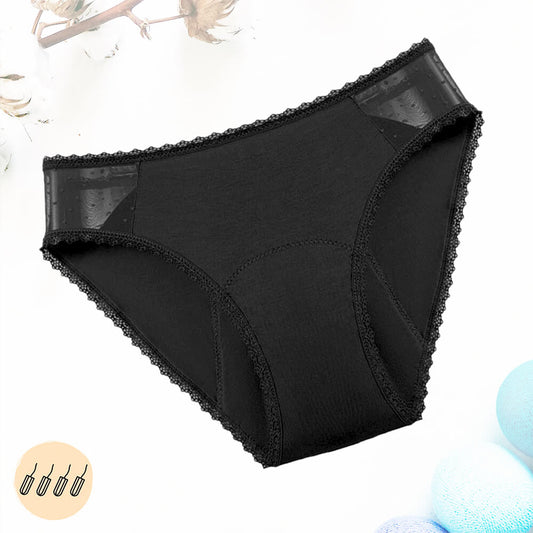
Leaking urine is a common problem that can affect people of all ages and genders. Symptoms include a sudden urge to urinate, involuntary loss of urine, and incontinence. The causes can be varied, ranging from muscle or nerve disorders to prostate problems, including pregnancy and childbirth. Urinary leakage can have a significant impact on the quality of life of those who suffer from it, affecting their self-confidence, their social life and their professional life. It is therefore important to understand the causes and available treatments for bladder leaks so that you can manage them effectively.
What is urinary leakage in women?
Leaking urine in women is a very common problem and can lead to significant psychological and physical consequences. Urinary incontinence is characterized by the involuntary loss of urine, which can be bothersome and embarrassing for affected women. The causes of female urinary incontinence can be multiple, including: pregnancy, childbirth, aging or even certain neurological disorders.
The treatment of urinary leakage in women will depend on each particular case and can vary between therapeutic exercises, the use of medical devices or even surgical treatments. It is therefore important that women with urinary incontinence consult a qualified healthcare professional in order to obtain an accurate diagnosis and a treatment plan tailored to their individual needs.
What are the causes of urinary leakage in women?
Leaking urine in women is a form of incontinence that is characterized by a lack of control over urine. They can be caused by physical, neurological or psychological factors.
The most common causes of urinary leakage in women are related to pregnancy and childbirth. Pregnancy can lead to abdominal distention and hormonal changes that increase the risk of bladder leakage. A difficult delivery, especially with forceps or a caesarean section, can also cause pelvic floor injuries and lead to urinary leakage.
Other possible causes include pelvic floor muscle problems, such as muscle weakness due to age-related changes, menopause, illnesses such as diabetes, or even infections such as UTI (urinary tract infection) . Excessive alcohol or caffeine consumption can also contribute to urinary incontinence symptoms in women. Finally, certain medications such as diuretics have also been associated with urinary leakage.
What are the symptoms of urinary leakage?
Bladder leakage is characterized by an uncontrollable loss of urine. They can be occasional or frequent, and are usually accompanied by symptoms such as abdominal pain, burning during urination or feelings of discomfort.
This type of incontinence is also accompanied by physical symptoms such as uncontrollable urine leakage, frequent and urgent urges to urinate, as well as the constant need to hold oneself back from urinating. People with urinary leakage may also notice an increase in the volume of urine produced compared to what is usual.
How to prevent urinary leakage in women?
Leaking urine is a problem that affects many women at different stages of their lives. They can be caused by poor diet, overly strenuous exercise, poor personal hygiene and hormonal disorders. It is possible to prevent urinary leakage in women by adhering to some simple measures.
First, it is essential to improve your lifestyle and your nutrition to reduce the risk of urinary leakage. A healthy, balanced diet with fruits, vegetables and lean proteins can help maintain good hydration levels and reduce the risk of incontinence. Additionally, moderate exercise can strengthen the pelvic floor muscles that support the bladder.
Second, women with urinary incontinence are advised to consult a medical professional to find a solution that suits their needs. Available treatments may include specific exercises to strengthen the pelvic floor or the use of an internal or external device to stop urinary leakage. Finally, it is important to remember that there are different treatments that can help women manage their symptoms related to bladder leakage and therefore improve their quality of life.
How to stop urinary leakage?
Urinary incontinence, or the experience of leaking urine, is a condition that affects millions of women around the world. Although this problem is very common, it is not inevitable and can be treated and prevented.
The first key to stopping bladder leakage in women is to improve overall health by adopting a healthier lifestyle and improving overall physical condition. A balanced diet high in fiber, regular exercise tailored to personal needs, and good personal hygiene can help prevent and treat urinary incontinence in women.
Additionally, certain pelvic floor training techniques can be helpful in strengthening pelvic floor muscles and helping to control urinary incontinence in women. It is essential to consult a medical professional for specific advice on how these techniques can help control urinary incontinence in women.
Finally, if these measures are not enough to completely stop urinary leakage, there are medical treatments available to help control or completely cure urinary incontinence in women. Medical treatments include medications that can help reduce or prevent bladder leakage, as well as surgical procedures that can correct the root cause of female urinary incontinence.
What are the risk factors for urinary leakage?
Leaking urine, also called incontinence, is a very common medical condition that can be caused by different risk factors. Among the major risk factors for bladder leakage are aging and age-related muscle loss. Women who are pregnant or have recently given birth are also more likely to suffer from incontinence than others.
Certain physiological factors such as urinary tract infections, neurological diseases or hormonal problems can also lead to urinary leakage. Finally, certain medications and excessive alcohol consumption can increase the risk of developing this medical condition.
What treatments are available for urinary incontinence?
Treatments for urinary incontinence are varied and can be categorized into medication, surgery, and rehabilitation.
Medications are used to treat the underlying causes of urinary incontinence, such as anxiety or depression. They may also help relieve symptoms by increasing bladder capacity and decreasing the number of urinations.
Surgery is usually indicated to correct anatomical problems such as muscle weakness or organ prolapse that cause urinary leakage. There are different types of surgical procedures that can help restore urinary control.
Pelvic floor retraining is a form of physical therapy that helps strengthen the muscles of the pelvic floor to improve bladder control and prevent urinary leakage. Rehabilitation can be carried out by a physiotherapist or a specialist doctor.
In conclusion, there are different treatments to treat urinary incontinence including medication, surgery and rehabilitation. Each of the treatments offers different benefits and risks that should be weighed by a medical professional before being implemented.
How to prevent urinary leakage?
Leaking urine is caused by incontinence, a lack of control of the muscles that support the bladder and sphincter. To prevent this problem, it is essential to strengthen these muscles with specific exercises. Pelvic floor stretching exercises are very effective in preventing urinary leakage.
These exercises can be done anytime and anywhere. They help reduce symptoms of incontinence and also stimulate blood flow to the perineum, which promotes better muscle recovery.
In addition to exercise, eating a healthy diet and staying hydrated is also important for maintaining optimal weight and overall good health.
What are the factors that can aggravate incontinence?
Urinary incontinence is a common problem that can be caused by several factors. Some of these factors can make incontinence and its symptoms worse. The main factors to take into account to avoid aggravating urinary incontinence are stress, pregnancy, overweight and menopause.
Stress is one of the main factors that can make urinary incontinence worse. People suffering from chronic stress or anxiety may develop symptoms of urinary incontinence because their body responds to anxiety-provoking situations by producing a hormone called cortisol which causes abnormal muscle contraction that can lead to involuntary loss of urine.
Pregnancy is another factor that can aggravate urinary incontinence in women. The pressure exerted by the baby on the bladder increases with the growth of the fetus during pregnancy and can cause symptoms of urinary incontinence such as uncontrolled leakage or an urge to go to the bathroom.
Overweight and obesity are also factors that can contribute to aggravating urinary incontinence. Obese people are more likely to develop incontinence because the extra weight puts pressure on the pelvic floor muscles and decreases their ability to control their bladder.
Finally, menopause is linked to an increased risk of developing symptoms of urinary incontinence as it leads to a decrease in estrogen levels, which causes the pelvic floor muscles responsible for bladder control to weaken.
Disposable urinary bag to better deal with urinary leakage
Urinary leakage is a problem that can affect daily dynamism and comfort. These kinds of problems can arise in a woman due to age, menopause, bladder infection, pregnancy and childbirth, neurological disorders, psychological disorders…
Urinary incontinence is characterized by unintentional loss and uncontrollable urine. This kind of incident can occur at any time in a person suffering from urinary leakage.
Various treatments are offered to treat urinary incontinence in women. Depending on the cause and symptoms of disease, the attending physician can offer drug treatments, perineal rehabilitation sessions, surgery, etc.
To be able to live normally on a daily basis during treatment and when urinary leakage is still uncontrollable, the disposable urine bag is required. This device is also recommended for people suffering from chronic urinary leakage following a stroke or other serious illness.
In your quest for a quality disposable urine bag, Urovogue urine bag is an excellent choice. This type of product allowing you to live decently on a daily basis despite an incontinence problem urinary is available in a set of 4 boxes each containing 3 urinary bags.
Convenient and efficient disposable urine bag for everyday comfort
Urovogue urinary bag is a disposable urinary bag allowing women to effectively manage their daily urinary leakage problems. Nevertheless, you should know that this is a product with unisex adapter and therefore suitable for all people who suffer from urinary incontinence, even children.
Each disposable and hygienic Uro Vogue urine bag has a capacity of 800 ml. That is, one pocket can be more than enough for about 12 hours. However, it depends on each person and how much fluid they take in on a daily basis.
La Urovogue urinary bag is discreet and not bulky. You can then easily store it in your bag and even in your pocket.
The Urovogue disposable urine bag is made of woven fabric and has a waterproof zip closure system. You can install it easily and replace it whenever necessary. It can also be used while standing, sitting or lying down thanks to its quality unisex adapter.
Furthermore, each Urovogue disposable urine bag incorporates within it a substance called Liqsorb. This substance absorbs and gels the urine so as to avoid odors and the risk of overflowing. The biodegradable polymers in this substance also prevent the proliferation of bacteria.
Grandmother's remedies to avoid urinary incontinence
Here are the top home remedies for preventing and managing urinary incontinence:
- Perform regular exercises (Kegel) to strengthen the pelvic floor
- Use perineal rehabilitation balls (love balls) to tone the perineum
- Hydrate regularly to avoid dehydration
- Avoidance of drinks and foods that can stimulate the bladder (coffee, tea, alcohol, acidic foods, vitamin C)
- Take advice from a pharmacist about medicines or vitamins that can help prevent incontinence
- Use sanitary napkins and underwear designed for bladder leaks to manage leaks.




